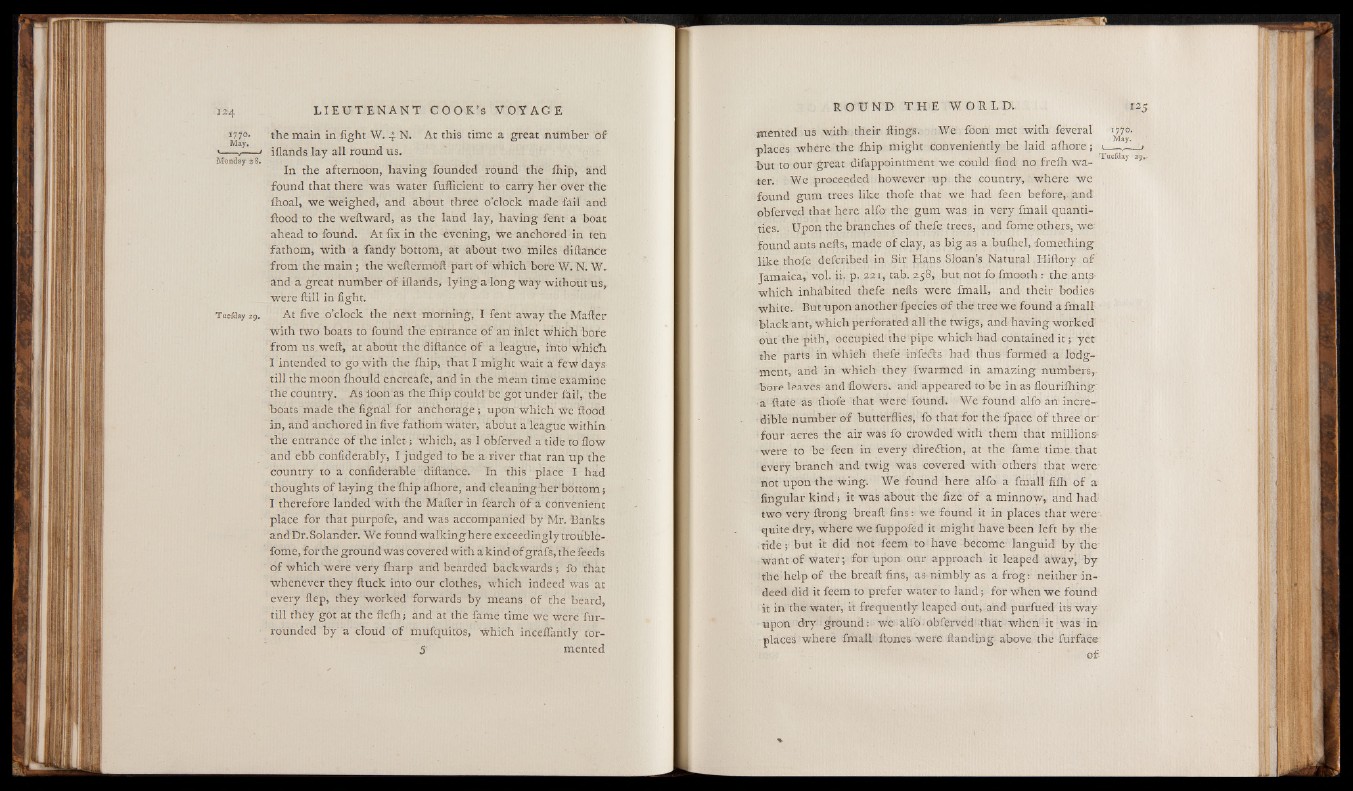
>77°- the main in fight W. & N. At this time a great number of
May.
>----,---- ' iflands lay all round us.
Monday 28. |
In the afternoon, having founded round the feip, and
found that there was water fufhcient to carry her over the
Ihoal, we weighed, and about three o’clock made fail and:
flood to the weftward, as the land lay, having fent a boat
ahead to found. At fix in the evening, we anchored in ten
fathom, with a fandy bottom, at about two miles diftance-
from the main ; the weftermoft part of which bore W. N. W.
and a great number of iflands, lying a long way without usr
were ftill in fight.
Tuefday 29. At five o’clock the next morning, I fent away the Mafier
with two boats to found the entrance of an inlet which bore
from us weft, at about the diftance of a league, into which
I intended to go wirh the fhip, that I might wait a few days-
till the moon fhould encreafe, and in the mean time examine
the country. As foonas the fhip could be got Under fail, the
boats made the fignal for anchorage; upon which We flood
in, and anchored in five fathom water, abo*ut a league within
the entrance of the inlet-; which, as I obferved a tide to flow
and ebb confiderably, I judged to be a river that ran up the
country to a confiderable diftance. In this place I had
thoughts of laying the fhip afhore, and cleaning her bottom;
I therefore landed with fee Mailer in fearch of'a convenient
place for that purpofe, and was accompanied by Mr. Banks
andDr.Solander. We found walkinghere exceedingly trouble-
fome, for fee ground was covered with a kind of grafs, the feeds
of which were very fharp and bearded backwards ; fo that
whenever they ftuck into our clothes, which indeed was at
every ftep, they worked forwards by means of the beard,
till they got at the flefe; and at the fame time we were fur-
rounded by "a cloud of mufquitos, Which inceflantly tor-
,5' mented
mented us with their flings. We foon met with feveral 1770-
places where the fhip might conveniently be laid afhore; i— — <
but to our great difappointment we could find no frefli wa- Tuefday 2'9“
ter. We proceeded however up. the country, where we
found gum trees like thofe that we had feen before, and
obferved that here alfo' the gum was in very fmall quantities.
Upon the branches of thefe trees, and feme others, we-
found ants nefts, made of clay, as big as a bufhel, fomething
like thofe defcribed in Sir Hans Sloan’s Natural Hiftory of
Jamaica, vol. ii. p. 221, tab. 258, but not fo fmooth r the ants-
which inhabited thefe nefts were fmall, and their bodies-
white. But upon another fpecies of the tree we found a fmall
black ant, which perforated all the twigs, and having worked
out the pith, occupied the pipe which had contained i t ; yet
the parts in which thefe infedts had thus formed a lodgment,
and in which they fwarmed in amazing numbers,
bore leaves and flowers, and appeared to be in as flourifeing;
•a ftate as thofe that were found. We found alfo an incredible
number of butterflies, fo that for the fpace of three or'
four acres the air was fo crowded with them that millions*
were to be feen in every diredtion, at the fame time, that
every branch and twig was covered with others that were
not upon the wing. We found here alfo a fmall fife of a
Angular kind; it was about the fize of a minnow, and had;
two very ftrong breaft fins: we found it in places that were'
quite dry, where we fuppofed it might have been left by the
tide; but it did not feem to have become languid by the'
want of water; for upon our approach it leaped away, by
fee help of the breaft fins, as- nimbly as a frog: neither indeed
did it feem to prefer water to land; for when we found
it in the water, it frequently leaped out, and purfued its way
upon dry ground: we alfo-obferved-that when it was in
places where fmall ftones were Handing above the furface
o f